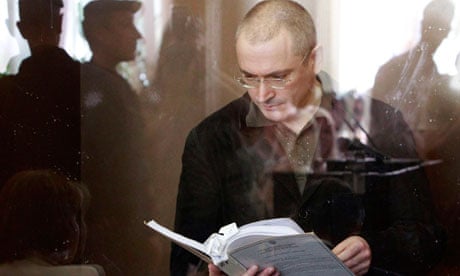The Observer: Jailed oligarch Mikhail Khodorkovsky warns UK on renewed alliance with Russia
 Mikhail Khodorkovsky says David Cameron must demand human rights are upheld before re-establishing relations
Mikhail Khodorkovsky says David Cameron must demand human rights are upheld before re-establishing relations
The jailed former oligarch, Mikhail Khodorkovsky, has urged David Cameron not to end Britain’s support for human rights in Russia, amid signs that the coalition is planning to forge a new and pragmatic alliance with the Kremlin.
Writing in the Observer, Khodorkovsky – once Russia’s richest man – argues that the prime minister should not improve relations with Moscow without first setting out “principled conditions” in areas such as democracy, civil liberties and human rights. Khodorkovsky, who was jailed in 2003, ostensibly for not paying tax but in reality for challenging Vladimir Putin, refers to himself as “a political prisoner”. He is now on trial for a second time, with Putin apparently planning to incarcerate him for another 15 years. Supporters say the latest “show trial” proceedings against him for embezzlement are ridiculous.
“I, as a Russian political prisoner, would very much like Britain to understand the fate of a 150-million strong people, capable and talented, who are searching for a way out of the darkness of totalitarianism into the light of freedom,” Khodorkovsky writes, in his first public comments on Anglo-Russian relations.
He continues: “I want to believe and hope that in the process of re-establishing full-scale partner relations with Russia, David Cameron and the British people will firmly take the side of democracy, and will offer Russians not only mutually beneficial economic co-operation, but an interaction based on clear transparent standards.”
During Gordon Brown’s premiership Anglo-Russian relations plunged to Cold War levels. Britain expelled four Russian diplomats following the murder of Alexander Litvinenko, the Russian spy-turned-dissident, in 2006 . The expulsions were in protest at Moscow’s refusal to extradite Andrei Lugovoi, the former KGB agent whom Scotland Yard detectives believe slipped polonium into Litvinenko’s tea.
Moscow responded by kicking out four British diplomats and closing the British Council office in St Petersburg. It also sent members of the pro-Kremlin youth group Nashi to harass Britain’s ambassador and demonstrate outside the British embassy in Moscow. In a further snub towards Britain, Lugovoi became a deputy in Russia’s state parliament, blaming Litvinenko’s death on MI6.
Next month, however, William Hague will go to Moscow in his first trip as foreign secretary, amid strong signs that the coalition is keen to move on from the Litvinenko affair. It wants to forge a new business-driven partnership with Russia, which is a key market for British companies, especially in oil and gas where they are currently shut out from projects. Speaking in Finland last month, Hague described Britain’s recent relations with Moscow as “very poor” and that he wanted to improve ties with the Kremlin “on a reciprocal basis”. Hague has vigorously denied he plans to downgrade Britain’s commitment to human rights.
The prime minister has made clear that foreign policy will be directed towards securing economic advantage for the UK, with less emphasis on Labour’s values-driven agenda. The Tories already work in Europe with Putin’s United Russia party, and sit with the Russians in a group in the Parliamentary Assembly of the Council of Europe.
Labour sources in Strasbourg say the Kremlin-appointed Russians frequently exploit their alliance with the Tories. “They are not MPs as we would know them. They are apparatchiks,” one source said, adding: “They use Tory MPs like the modern equivalent of Lenin’s useful fools.”
“There is a chunk of Tory opinion which is quite sympathetic to this kind of patriotic Russian motherland idea,” Chris Bryant, the former minister of state for Russia, told the Observer. “I think [the Tories] want to press the reset button on relations with Russia and they are prepared to swallow anything Putin says.”
In today’s Observer, Khodorkovsky, former CEO of the Yukos oil company, writes: “Russia remains an authoritarian state with an extremely high level of corruption. In contrast to Britain, the principles of equality before the law and an independent court system are virtually absent in Russia … My personal fate is the most eloquent testimony to this.”



